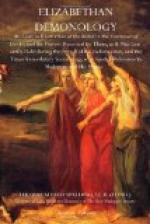[Footnote 1: This expression occurs in Sonnet cxliv., and evidently with the meaning here explained; only the bad angel is supposed to fire out the good one.]
[Footnote 2: Harsnet, pp. 77, 96, 97.]
[Footnote 3: Ibid. p. 65.]
77. The more violent or uncommon of the bodily diseases were, as the quotation from Cotta’s book shows[1], attributed to the same diabolic source. In an era when the most profound ignorance prevailed with regard to the simplest laws of health; when the commoner diseases were considered as God’s punishment for sin, and not attributable to natural causes; when so eminent a divine as Bishop Hooper could declare that “the air, the water, and the earth have no poison in themselves to hurt their lord and master man,"[2] unless man first poisoned himself with sin; and when, in consequence of this ignorance and this false philosophy, and the inevitable neglect attendant upon them, those fearful plagues known as “the Black Death” could, almost without notice, sweep down upon a country, and decimate its inhabitants—it is not wonderful that these terrible scourges were attributed to the malevolence of the Evil One.
[Footnote 1: See secs. 63, 64.]
[Footnote 2: I Hooper, p. 308. Parker Society.]
78. But it is curious to notice that, although possessing such terrible powers over the bodies and minds of mortals, devils were not believed to be potent enough to destroy the lives of the persons they persecuted unless they could persuade their victims to renounce God. This theory probably sprang out of the limitation imposed by the Almighty upon the power of Satan during his temptation of Job, and the advice given to the sufferer by his wife, “Curse God, and die.” Hence, when evil spirits began their assaults upon a man, one of their first endeavours was to induce him to do some act that would be equivalent to such a renunciation. Sometimes this was a bond assigning the victim’s soul to the Evil One in consideration of certain worldly advantages; sometimes a formal denial of his baptism; sometimes a deed that drives away the guardian angel from his side, and leaves the devil’s influence uncounteracted. In “The Witch of Edmonton,"[1] the first act that Mother Sawyer demands her familiar to perform after she has struck her bargain, is to kill her enemy Banks; and the fiend has reluctantly to declare that he cannot do so unless by good fortune he could happen to catch him cursing. Both Harpax[2] and Mephistophiles[3] suggest to their victims that they have power to destroy their enemies, but neither of them is able to exercise it. Faust can torment, but not kill, his would-be murderers; and Springius and Hircius are powerless to take Dorothea’s life. In the latter case it is distinctly the protection of the guardian angel that limits the diabolic power; so it is not unnatural that Gratiano should think the cursing of his better angel from his side the “most desperate




